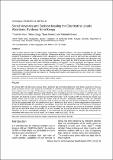Social Networks and Decision Making for Clandestine Unsafe Abortions: Evidence from Kenya
View/
Publication Date
2015-03Type
Article, Journalviews
downloads
Metadata
Show full item recordCitation
Osur, J. & Orago, Alloys & Mwanzo, Isaac & Bukusi, Elizabeth. (2015). Social Networks and Decision Making for Clandestine Unsafe Abortions: Evidence from Kenya. African journal of reproductive health. 19. 34-43.
Abstract/
Little is known about the role of social networks in promoting clandestine abortions. This study investigated the role social networks play in decision making for and facilitation of clandestine abortions. It was a mixed method study in which 320 women treated for complications of unsafe abortions were interviewed in a cross sectional survey to determine their consultation with social networks and how this ended up in clandestine abortions. Information obtained was supplemented with information from focus group discussions, case studies and key informant interviews. It was found that 95% of women consulted their social networks as part of decision making before aborting clandestinely and unsafely. The man responsible for pregnancy, friend of same sex and woman’s mother were the most consulted at 64%, 32% and 23% respectively. 92% of advice was for the woman to abort. The man responsible for pregnancy and the woman’s mother were the most influential advisors (p˂0.05). Intermediaries linked the woman to clandestine and unsafe abortion and included agents and previous clients of clandestine abortion providers and the woman’s friends and relatives. Decision making and seeking for clandestine abortion were therefore found to be shared responsibilities. It is recommended that programs for reducing unsafe abortions be designed with this fact in mind. (Afr J Reprod Health 2015; 19[1]: 34-43).
Publisher
PubmedCollections
- General - GEN [367]

